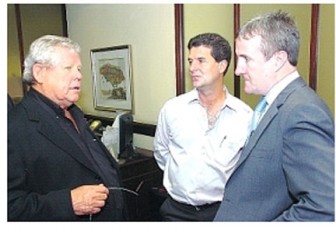(Jamaica Observer) DIGICEL CEO Mark Linehan has warned that continued increases in the charge for electricity could force many local companies to shut their doors in another five years.
“If something isn’t done on alternative energy or the price of power from JPSCo, I really worry about the economy in three to five years’ time,” Linehan said yesterday.
“It is not only going to stifle, but it is going to shut down a number of businesses,” he contended.
He was among guests from the private sector at a luncheon hosted by Observer chairman Gordon ‘Butch’ Stewart at the newspaper’s Beechwood Avenue headquarters in Kingston to discuss the 2011/12 budget and related matters.

The telecoms company boss cited the manufacturing and hotel sectors, as well as his own Digicel, as examples of businesses that are especially affected by high energy costs.
“If you look at the increases over the last number of years, [and] if it continues in the same run rate, power costs are going to stifle economic growth, no doubt about it,” Linehan declared.
He argued that the effect of high energy costs on businesses “cuts two ways” as the disposable income of consumers is vastly decreased; thus cutting revenue source while the company has to service an ever-increasing energy bill.
“So you have a battle on your hands to maintain your revenue while the price of power continues to increase,” said Linehan.
Stewart, who has in the past warned about the danger of exorbitant energy costs, added that some seven years ago Jamaicans were paying 12 to 13 cents per kilowatt hour, while eastern Caribbean islands paid approximately 27 cents to 29 cents and The Bahamas was just over 20 cents. Jamaica, with a much larger population was now paying on par with those islands.
“Jamaica is now right up there [and] we are a much bigger society than St Lucia with 160,000 and Bahamas with 300,000,” said Stewart. “Something has gone very wrong.”
“I know people with some very small dwellings and when they tell me how much they pay, it’s too much money… I think government is going to be forced into some kind of investigation to see what is possible,” Stewart said, noting that a contract with JPS, agreed by the previous Government, guarantees percentage returns, which “takes away incentive to make the business more efficient”.
“How do you get past that?” he questioned.
Alison Peart, partner at Ernst & Young Caribbean, told the luncheon that government incentives in islands such as Barbados and Trinidad and Tobago contributed largely to energy conservation.
“I was a little concerned that we did not see anything in the budget in respect to energy conservation,” she said.
Peart said Jamaica needed to go the way of encouraging ordinary citizens through monetary incentives to turn to solar energy as Barbados was doing.





